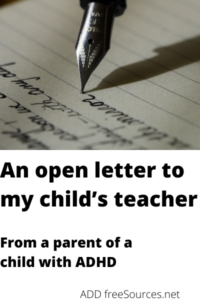Good afternoon Mr/Mrs/Ms New Teacher,
I trust that this letter finds you well. I hope you have had a relaxing summer holiday and are feeling relaxed and replenished after a busy year. I look forward to meeting you and getting to know you over the coming school year.
I hope that we will work well together. The way I see it; my child’s successful education depends on teamwork, with you and I understanding and supporting each other.
I want to start by expressing the gratitude that I have for your dedication and devotion to being a teacher. I am in awe of the work you put in; those restrictions placed on you, and those long hours required to do your job. I know that finishing work for the day is not the 3:15 pm I once imagined. After attending to you and your family’s own needs – dinner, chores, and time to connect, you still have to sit down and plan tomorrow’s lessons, mark your pupils’ work, and reply to parents’ emails. The list goes on. You probably even had to work over the summer holidays too; labeling books, and doing much more to prepare for this school year.
My child will be joining you this year,
He/she has a diagnosis of ADHD.
They may or may not be medicated.
He/she is not defined by their diagnosis, they are themselves an individual person like you and me, but with their diagnosis brings some slight differences I think you should know about.
Perhaps you have taught pupils with ADHD before or someone in your family shares the same diagnosis. If so, I am sure you know lots about ADHD already. Hopefully your school supports extra Special Education training for staff
I hope that teaching my child this year will be fun and rewarding for you. He/she really is a sensitive, caring, energetic, and passionate child. I hope he/she will make you smile with their quick wit and sense of humor.
He/she does fidget a lot. They may scribble or play with pens while listening to you to help them. For your own reassurance, check that they are listening but please don’t assume that they are not and take that pen/item from them. I can provide a few unobtrusive fidgets to use in the classroom.
My child doesn’t want to zone out when you talk, but if you notice that they are; I find a little break helps. Ask them to either fetch you something, get a quick drink from the water fountain or my child’s favorite; some jumping jacks somewhere private.
This little burst of activity really helps reset and refresh his/her brain.
My child is a chatterbox. Be assured he/she will butt in when you talk or forget to put their hand up. He/she doesn’t mean to be rude but may worry about forgetting the answer and keen to impress you with their knowledge and questions.
He/she isn’t great at taking turns when playing with classmates or friends. They don’t mean to be a bossy-boots. A bit of gentle prompting about give and take, or encouraging a change of game works well at home. I am working a lot with him/her at the moment about friendships, sharing, and being respectful.
He/she can be forgetful, disorganized, and appear unmotivated to start tasks.
He/she just doesn’t know where to start and so needs some gentle encouragement and perhaps help to initiate or better organize their task. I find that I have to really break tasks down for them into small steps and provide lots of repetition. Executive functioning and working memory are the culprits.
He/she has suggested to me that they would like to discuss with you a “prompt” that you can both agree on to help them know when it’s time to start work. Something gentle and friendly, please. You see they are afraid that you may say something that will embarrass them or draw attention to them.
My child really wants to work hard for you this coming year. He/she has talked excitedly about you all summer; what you might be like, whether you wear glasses, and what golden time treats you may give the class as a reward.
Sometimes he/she just doesn’t have that ability to wait for a later reward. It may be a bad day for paying attention, for being more hyperactive, or he/she may have slept poorly or is feeling nauseous from their medication. But hopefully, you can learn to detect a bad day from a good day, reward the good days, and be understanding of the bad.
Be assured that we both want what’s best for your class and my son/daughter to ensure a successful and happy new school year.
See you very soon,
A parent of a child with ADHD
 This is an open letter written by Nochola Parody to articulate the thoughts and worries a parent of an ADHD child may feel when their child starts school. Nicola is an ADHD and Learning Disabilities advocate who hosts the Facebook page, Heidi and Me: Our Neurodiversity Journey.
This is an open letter written by Nochola Parody to articulate the thoughts and worries a parent of an ADHD child may feel when their child starts school. Nicola is an ADHD and Learning Disabilities advocate who hosts the Facebook page, Heidi and Me: Our Neurodiversity Journey.
The letter had an incredible response. 
More importantly, it was read and shared by many parents of other neurodiverse children.
Heidi and Nicola’s photo found on Facebook (Heidi and Me )
Title Photo by Aaron Burden on Unsplash
Modified on Canva.com


